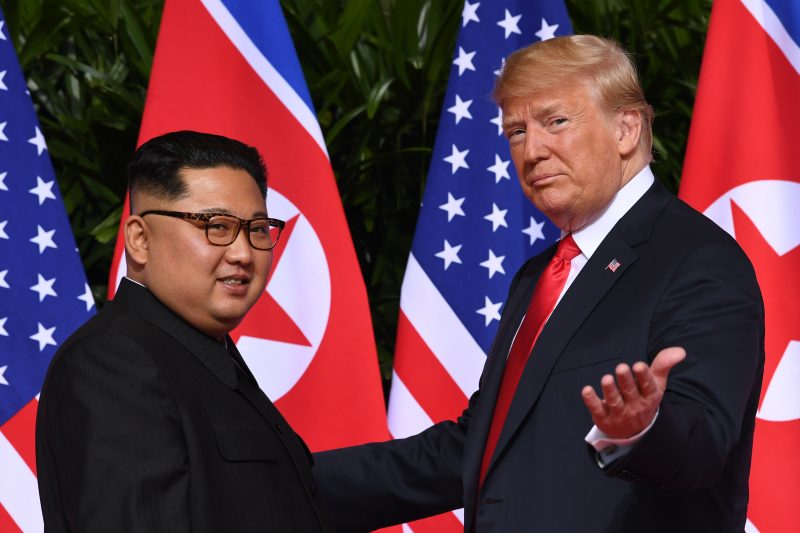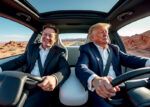Nuclear breakthrough or vague promises? Outcomes abound for Trump and Kim
President Donald Trump (R) meets with North Korea’s leader Kim Jong Un in Singapore in June 2018 (SAUL LOEB)
Washington (AFP) – Could the United States and North Korea reach a historic accord — or could it all fall to pieces?
As President Donald Trump prepares for a historic second summit with North Korean leader Kim Jong Un, observers see a wide array of possible outcomes.
Here are some scenarios that could emerge from the summit, which opens Wednesday in Hanoi:
– Complete breakdown considered unlikely –
The US pointman on North Korea, Stephen Biegun, and his counterpart Kim Hyok Chol are holding working-level talks in Hanoi to lay the groundwork for the leaders.
A complete collapse of the summit seems “unlikely because Trump and Kim are so invested in the meeting,” said Viping Narang, an associate professor at the Massachusetts Institute of Technology.
But what comes out of the talks is another story. The two leaders’ first summit in Singapore ended in a statement that agreed on “complete denuclearization” — which Pyongyang defines broadly as an end to nuclear weapons on the Korean peninsula.
The United States says it is seeking the “verifiable and irreversible” denuclearization of North Korea — a formulation Pyongyang is sure to resist.
– Repeat of Singapore is defeat for Trump –
A simple repeat of the Singapore declaration would be widely seen in the United States as a defeat for Trump.
“What would be a failure is another vague statement about intentions with very little concrete action that each side is committed to take,” said Jung Pak, a former CIA analyst who is now a senior fellow at the Brookings Institution.
Narang said that a repeat of Singapore would be the favored outcome for North Korea, which would face no fresh constraints.
“There’s a paradox: for the summit to be useful for the North Koreans, the working-level meetings need to be as vague and drawn-out as possible,” Narang said.
“But for the summit to be useful for the US, the working-level meetings have to deliver something concrete.”
A Western diplomat, speaking on condition of anonymity, said that if nothing major emerges by the US summer, hawks around Trump such as his national security adviser, John Bolton, could increasingly press to be done with talks and focus on pressure.
– Or Trump yields ground –
No matter how much Trump’s team prepares him, this most untraditional of US presidents could reject expert advice and, as is his wont, go with his gut.
Such a scenario would be seen as a catastrophe by much of the Washington establishment, which has spent decades trying to figure out North Korea.
“A failure would be that the US gives more than it receives,” said Abraham Denmark, director of the Asia program at the Woodrow Wilson International Center for Scholars.
Denmark voiced fear that Trump could declare a formal end to the 1950-53 Korean War — which closed only with an armistice — without significant action from Pyongyang.
“Declaring an end to the war is a significant concession and should not be done lightly,” he said, fearing an effect on the dynamics between the two Koreas.
One major fear for South Korea and Japan is that Trump reaches a deal that only restricts intercontinental missiles that could hit the United States, while not taking up shorter-range weapons that threaten them.
Secretary of State Mike Pompeo has repeatedly spoken of the North Korea summit as a way to protect Americans, raising worries in the region.
– US hopes for verifiable denuclearization –
The best result for the United States would be a step-by-step, verifiable agreement in which the North Koreans commit to ending their nuclear program beyond verbal promises.
North Korean concessions over which the United States could cry victory include the suspension of all the regime’s missile and nuclear sites and the destruction of some of them, Denmark said.
For Narang, the destruction of the Yongbyon complex — North Korea’s main nuclear center — would mark an important step.
But the key for Washington would be inspections by the UN’s International Atomic Energy Agency to verify North Korea is getting rid of its nuclear weapons.
In return, Washington could open a liaison office in Pyongyang — a step toward full diplomatic relations — or declare an end to the war.
Kim’s most urgent goal is the lifting of international sanctions that have held back his hopes of economic development.
The United States has so far insisted that it will not provide aid until denuclearization.
But Biegun recently hinted at early steps, saying, “We didn’t say we won’t do anything until you do everything.”
Disclaimer: This story is published from a syndicated feed. Siliconeer does not assume any liability for the above story. Validity of the above story is for 7 Days from original date of publishing. Content copyright AFP.


